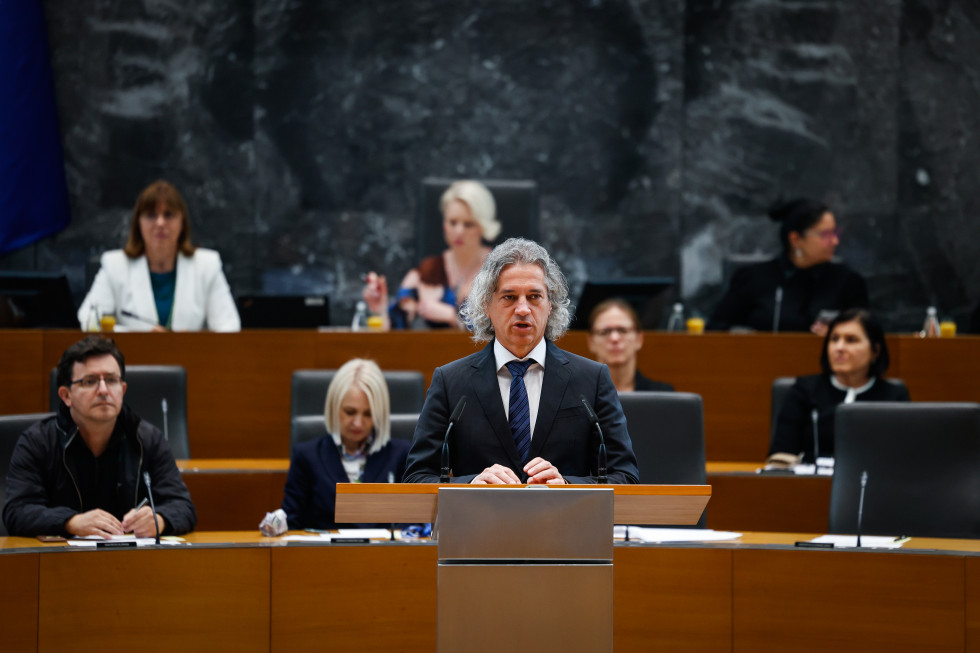2023-2024 Budget Proposal: We are prepared to act swiftly and decisively.

Prime Minister Robert Golob today outlined the budget proposal in the National Assembly of the Republic of Slovenia | Author Bor Slana/STA
The Slovenian Government has therefore drawn up its draft budgets based on the IMAD scenario, bearing in mind that the situation may deteriorate. In its Autumn Forecast, IMAD projected a significant decline in gross domestic product (GDP) growth for the year ahead, but still with positive growth at around 1.2% in 2023 and with an increase to 2.6% in 2024. The Prime Minister noted that Slovenia's growth rates were not lagging behind the European Union. He also stressed that, in the face of the uncertainty we are witnessing, it was difficult for financial institutions to predict a single scenario for the period ahead.
The Prime Minister presented the macroeconomic forecasts, highlighting that the main downturn in the economic climate was due to a drop in consumer confidence. Some sectors, such as construction and manufacturing, still show a positive trend, but they are cooling "because of a decline in confidence, which stems from addressing people in a purely negative tone. Nevertheless, the future is not as bleak as it appears. In two weeks, we will be deciding on solutions at the EU level. This makes me optimistic that the coming winter will be less harsh than we feared. We have reached a consensus at the European level on how to intervene in energy markets and how to find solutions to help industry and the population."
The German Government has announced a EUR 200 billion relief package. As Slovenia is heavily dependent on the German and European economies, this will also have an impact on Slovenian markets. The Prime Minister added, "I will not ignore the fact that the situation is uncertain and unpredictable, but the response to that uncertainty is in our flexibility and willingness to act quickly and decisively."
Fiscal rules are still frozen at the EU level for the next year, which is why the Government has projected a deficit of more than 3% in 2023, which stands at 5.3% of GDP. For 2024, the budget is planned to be within the fiscal envelope, that is at the level of 2.6% of GDP. Revenue is projected to be similar for both years, at record levels of 13.4 billion in 2023 and 13.8 billion in 2024. Expenditure is planned at 16.7 billion next year and 15.5 billion the year after.
"In terms of expenditure, large reserves have been planned – a total of 1.5 billion reserves are foreseen, of which 1.21 billion to cope with the energy crisis and price increases. Most of them are earmarked for the economy, more than a billion. Time and the success of the European reforms will tell whether we will actually need them," the Prime Minister Golob explained. The draft budgets also include a current reserve of EUR 260 million, a COVID reserve of EUR 60 million and a natural disaster reserve of EUR 90 million."
The key areas of the Government action covered by the budget include healthcare, the green transition, intergenerational challenges, digitalisation, a resilient and competitive economy, and research and development. The Prime Minister said "Despite the fact that we are living in uncertain times and building up large reserves, we are not cutting back on investments. A high volume of investments is planned for 2023, which is significantly higher than in 2024. We believe it is precisely during times of crisis that investments in development need to be boosted. We will tackle the crisis in the right way, which is why we have reserves, but the crisis will not hold back development because we have a unique opportunity to raise Slovenia to a higher level of international and global competitiveness. And this is our main guiding principle." The investments do not include spending from the Recovery and Resilience Plan and the European Cohesion Policy.
Citizens do not have to be afraid of the energy supply running out: "I am aware that many people today are living in hardship and wondering whether we will have enough energy products this winter. Not only will there be enough energy products and not only are prices for key energy products already regulated, but today they are already lower than they were in August. They will also stay at the same level throughout the winter," the Prime Minister said.
The Prime Minister called on all economic operators and public institutions without electricity purchase contracts to contact the Ministry of Infrastructure, as a special programme had been set up for them. He stressed that they should not conclude contracts until the end of October 2022 when a new regulatory framework for all energy products will be known at the European level, which will not only limit prices but also have the effect of reducing them.

